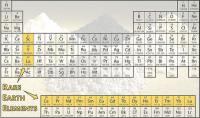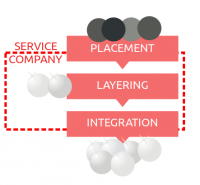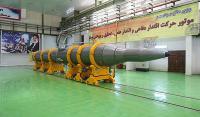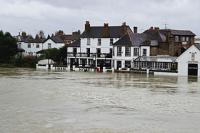-
Extracting rare-earth elements from coal could soon be economical in U.S.

The United States could soon decrease its dependence on importing valuable rare-earth elements (REEs) which are widely used in many industries, according to a team of researchers. who found a cost-effective and environmentally friendly way to extract these metals from coal byproducts.
-
-
Hyperion cyber security technology receives commercialization award
The commercial licensing of a cybersecurity technology developed at the Department of Energy’s Oak Ridge National Laboratory has been recognized by the Federal Laboratory Consortium for Technology Transfer (FLC) as a good example of moving technology to the marketplace. Hyperion, which has the capability automatically to analyze executable programs and recognize behaviors that signal malicious intent and vulnerabilities, was licensed to Virginia-based R&K Cyber Solutions, LLC, in late 2014.
-
-
DEA, European authorities uncover massive Hezbollah drug, money-laundering operation

The U.S. Drug Enforcement Administration (DEA) yesterday announced what the agency described as a “significant enforcement activity,” including arrests targeting Lebanese Hezbollah’s External Security Organization Business Affairs Component (BAC), which is involved in international criminal activities such as drug trafficking and drug proceeds money laundering. These proceeds are used to purchase weapons for Hezbollah for its activities in Syria.
-
-
Aussie stationery chain pulls world globe which names Palestine, omits Israel
The Australian stationery chain Typo has stumbled into one of the world’s most contentious issues – and had to pull a line of globes which named Palestine but omitted the label “Israel.” Israel’s name was not omitted altogether: The globe was designed so that Israel and twelve other small countries were represented by a number on the map, corresponding to a number in a legend at the base of the globe. The globe sparked charges of anti-Semitism, but the company’s decision to halt production of the globes has led to boycott threats by Palestine advocates.
-
-
Rapid, affordable energy transformation in U.S. possible
The United States could slash greenhouse gas emissions from power production by up to 78 percent below 1990 levels within fifteen years while meeting increased demand, according to a new study. The study used a sophisticated mathematical model to evaluate future cost, demand, generation, and transmission scenarios. It found that with improvements in transmission infrastructure, weather-driven renewable resources could supply most of the nation’s electricity at costs similar to today’s.
-
-
New regulations improve opportunities for certain highly skilled workers

DHS’ U.S. Citizenship and Immigration Services on Friday announced changes to the programs serving the H-1B1, E-3, and CW-1 nonimmigrant classifications, and the EB-1 immigrant classification. The purpose of the changes was to remove the obstacles and disadvantages workers in these categories faced compared to workers in other visa classifications.
-
-
World leaders urged to oppose encryption back doors
In an open letter made public on Monday, nearly 200 Internet and digital rights leaders and experts, companies, and organizations are calling on the Obama administration and other world leaders to reject efforts to create “back doors” to encryption. “Encryption tools, technologies, and services are essential to protect against harm and to shield our digital infrastructure and personal communications from unauthorized access,” the letter states.
-
-
Administration tries to harness Silicon Valley’s talent for fight against ISIS

Senior administration intelligence officials are meeting today (Friday) with Silicon Valley’s major technology firms — companies including Facebook, Twitter, Apple, Microsoft, YouTube , LinkedIn, Dropbox, and others — in an effort to recruit them and their technological know-how in the fight against radicalization and terrorism.
-
-
Extreme weather increasingly threatening U.S. power grid
Power outages related to weather take out between $18 billion to $33 billion from the nation’s economy. Analysis of industry data found that these storms are a growing threat to, and the leading cause of outages in, the U.S. electric grid. The past decade saw power outages related to bad weather increase, which means that power companies must find a way address this problem.
-
-
U.S. to impose new sanctions on Iran over ballistic missile program

The United States is preparing a new round of economic sanctions against Iran after Iran had violated agreements related to its ballistic missile program by testing, on 10 October, an advanced version of one of its missiles. The ballistic missile agreement is unrelated to the nuclear agreement the P5+1 powers signed with Iran last summer. The nuclear program-related sanctions would begin to be lifted in 2016 if Iran fully complies with the requirements of the nuclear deal.
-
-
Calls for tighter regulations of the design of toy guns

The death of people – often children – who carry BB or pellet guns resembling real weapons has prompted lawmakers and activists to call for tighter regulations on the design of non-lethal guns. California has already passed such a law, and it would go into effect on Friday.
-
-
As storms continue to batter U.K., estimates of cost rise

As Storm Frank – which is following on the heels of Storms Eva and Desmond — continues to batter England, Scotland, and Wales, estimates of the cost of the damage wrought continue to rise. The total economic loss caused by the three Storms may well breach £3 billion – and these projections do not include any government spending on flood defenses, estimated to be between £2.3 billion and £2.8 billion.
-
-
U.K.: Economic costs from flooding could reach £1.5bn, reduce GDP growth

Economic losses caused by the flooding which has devastated parts of Britain in the past few days could exceed 1.5 billion pounds, and shave 0.2-0.3 percent off GDP growth overall in the first quarter of 2016. Insurers will likely shoulder the bulk of the burden after first Storm Desmond and then Storm Eva saw waters swamp large swathes of the country.
-
-
Climate change losses for Southeast Asia well above previous estimate: ADB

Economic losses from the impacts of climate change in Southeast Asia could be 60 percent higher than previously estimated, reducing the region’s gross domestic product (GDP) by up to 11 percent by 2100, according to a new Asian Development Bank (ADB) study. The analysis is an update to a 2009 ADB report that estimated a 7 percent annual reduction in economic output due to climate change.
-
-
Growing risks in flood-prone areas due to economic growth more than climate change
Worldwide economic losses from river flooding could increase 20-fold by the end of the twenty-first century if no further actions on flood risk reduction are taken. There are two contributors to risks associated with river flooding. Floods’ frequency and severity (both influenced by climate change); and the exposure to floods of people and economic assets (determined by economic activity and human residency in flood-prone areas). Researchers calculate that in many flood-prone regions of the world, more than 70 percent of the increase in flood-related risks over the coming decades can be attributed to economic growth and residency patterns in flood prone areas.
-
- All
- Regional
- Water
- Biometrics
- Borders/Immig
- Business
- Cybersecurity
- Detection
- Disasters
- Government
- Infrastructure
- International
- Public health
- Public Safety
- Communication interoperabillity
- Emergency services
- Emergency medical services
- Fire
- First response
- IEDs
- Law Enforcement
- Law Enforcement Technology
- Military technology
- Nonlethal weapons
- Nuclear weapons
- Personal protection equipment
- Police
- Notification /alert systems
- Situational awareness
- Weapons systems
- Sci-Tech
- Sector Reports
- Surveillance
- Transportation
Advertising & Marketing: advertise@newswirepubs.com
Editorial: editor@newswirepubs.com
General: info@newswirepubs.com
2010-2011 © News Wire Publications, LLC News Wire Publications, LLC
220 Old Country Road | Suite 200 | Mineola | New York | 11501
Permissions and Policies
Editorial: editor@newswirepubs.com
General: info@newswirepubs.com
2010-2011 © News Wire Publications, LLC News Wire Publications, LLC
220 Old Country Road | Suite 200 | Mineola | New York | 11501
Permissions and Policies
